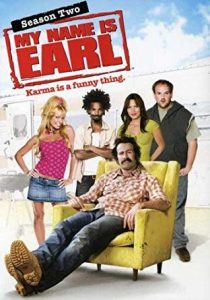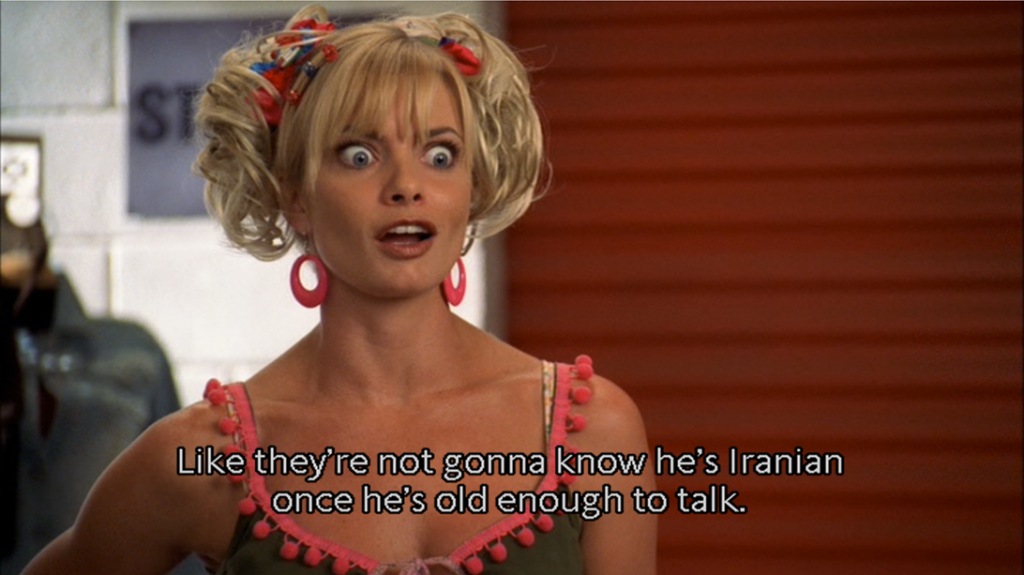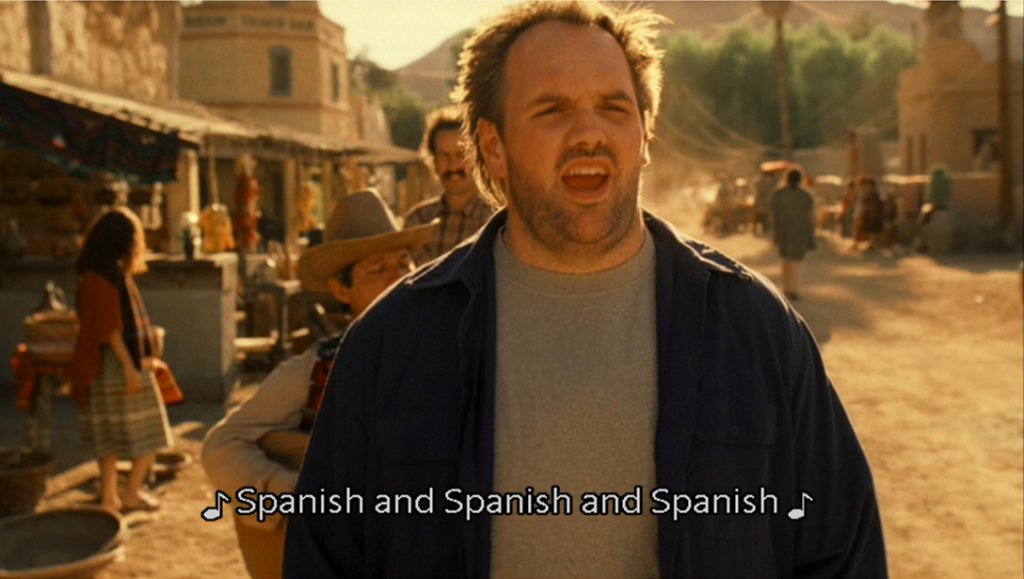My Name is Earl: A Review
Posted By Howe Abbott-Hiss On In North American New Right | Comments Disabled“You know the kind of guy who does nothing but bad things, and wonders why his life sucks? Well, that was me.” So began the early episodes of My Name is Earl, a comedy series which ran from 2005 to 2009 and followed the life of working-class white man Earl Hickey on his quest to make up for all of his past sins. This series from writer and director Greg Garcia combined genuinely funny and creative writing with an unfortunate proto-SJW mindset which elevated “victim” groups and denigrated white people in a way that is increasingly prevalent in popular entertainment today.
The series is explicitly a morality play, making it surprising that it was so well-received in a time of widespread nihilism. There are two factors which explain this. First, the series does not endorse belief in Christianity or God, but instead in a familiar concept from Hinduism and Buddhism. Earl believes that the events in his life are the product of karma, explaining that if you “do good things, good things happen.” This is not only a matter of being treated by others the way he treats them, but refers to a higher moral order in life, as he even attributes seemingly random strokes of luck to karma.
Second, the morality expressed has nothing to do with the self-denial encouraged by traditional religions, which would be rejected by many as too restrictive or boring. Instead it is more in line with social justice activists’ focus on being “inclusive” and “tolerant” of those who are different in particular ways. This means flattering various minority groups in comparison with whites, as well as being very sensitive to the feelings of people with disabilities and various potentially comedic conditions such as dwarfism. Those who do not do so are not presented in a positive light.
Earl’s ex-wife is a blonde woman named Joy Turner, played by Jaime Pressly. Pressly had earlier starred in an unsuccessful comedy called Poor White Trash, whose title gives a good summary of the way she and most other characters in the series are depicted. Despite her name, Joy’s most common emotion is anger, which sometimes alternates with glee at her ability to commit amusing crimes such as grand theft auto. A running theme in the show is her ignorance and intolerance of various kinds of “diversity,” including other ethnic groups. At one point she is in a discussion with a career criminal to whom she hopes to sell a stolen truck, but he is put off by the fact that the truck still has the name of the store it was stolen from painted in large letters on its side. She objects that he had successfully sold an Iranian baby, but he tries to explain that this was less risky as the baby did not have “Iranian baby” painted on its side. “Like, they’re not gonna know he’s Iranian once he’s old enough to talk,” she responds, apparently thinking that babies come preprogrammed with the language of their ethnic group.
Joy is also offended at having a woman appointed as her defense attorney after she is charged with stealing a truck, and briefly refuses her services after she learns that the woman is deaf. However, after finding that she herself is too dim to understand the law and represent herself in court, she realizes she needs the woman’s help and apologizes.
Joy’s awkward attempts at relating to her deaf lawyer are an example of another point of social justice thinking, which is that even honest attempts by ordinary people to relate to various “victim” groups are strangely considered offensive. Joy explains that she knows what it is like being “prejudiced against,” since her husband is black, and her lawyer finds this cringe-inducing. But of course, if one were to accept the social justice narrative around “marginalized” groups, both blacks and the deaf would be discriminated against, and this would give them something meaningful in common, so it is not clear what the problem is.
Along similar lines, Earl tries to relate to a group of circus freaks who like to avoid public attention outside of their performances because of how people see them. His attempt to get to know them is genuine, inspired by the desire to make up for his past mockery of one of them in grade school. He recounts his experience as a child of being embarrassed to take his shirt off at the pool because of his hairy nipples, which other children laughed at him for, but this attempt disgusts them as they consider his situation less serious than their own. The implication is that “diverse” people’s lives are so unique that any attempt by someone from another group to relate to their experiences is ignorant and offensive. This all reflects a very unhealthy attitude of how easily offended one is entitled to be if one belongs to a “marginalized” group, presaging the current concept of “microaggressions.”
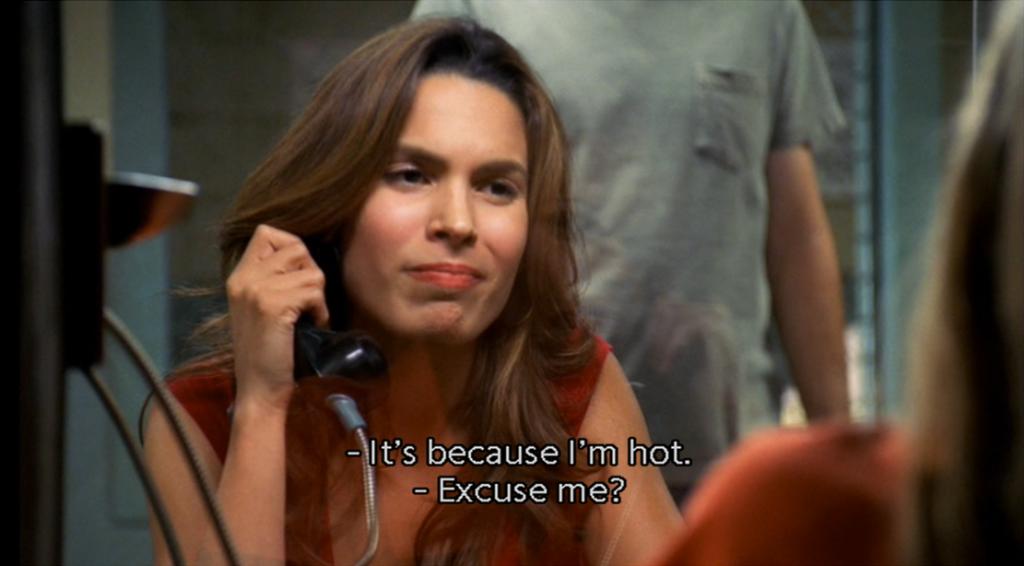 [3]
[3]Hispanic illegal immigrant maid Catalina accuses white woman Joy of being jealous of her appearance.
Another major character is Catalina, an illegal immigrant maid whose role is partly to portray Hispanic women as very attractive. She was previously the “number one dancer” at a strip club, but her act was so exciting that it caused an old man in the audience to have a fatal heart attack. Earl’s dimwitted brother Randy fantasizes about Catalina repeatedly, ultimately marrying her, and a female desk clerk gasps upon seeing her and exclaims, “You are as beautiful as the legends describe!” This all comes across as an artificial attempt to flatter her appearance on the part of the show’s writers, particularly in comparison to how Joy is depicted.
Hispanic Catalina serves to make her white nemesis Joy seem inferior in both appearance and personality. Throughout the series, Joy is made ugly through her obnoxious emotional outbursts and terrible fashion sense, despite the fact that the actress herself, Jaime Pressly, was a successful model. In a conversation with the latter, when she is in prison for grand theft, kidnapping, and assault, Catalina boasts of her “hotness” and accuses Joy of jealousy while mocking her face and body. Even though she needs Catalina’s help to get bailed out, Joy can only briefly contain her hatred for the woman of color, and again displays her ignorance of other cultures by mocking her for being and speaking “Mexican,” although she is actually from another unspecified Spanish-speaking country. Catalina, of course, is not so “bigoted” and does not respond with any racial or ethnic comments about Joy.
While Joy is in prison, Earl seeks to bail her out by asking for money from the only rich person he knows, a multiple business owner named Chubby. This strange and perverted old man offers to help Earl if he can bring back his old star dancer, but Catalina backs out of this arrangement once she learns that it will help Joy. Earl’s friends harangue him so much about the circumstances which would result from Joy staying in prison that he loses consciousness from stress. Ultimately, though, Catalina admits that in refusing to help, she was being a “buttbag,” which she helpfully explains is “a bag of butts.” Considering Earl’s predicament, Catalina renounces buttbaggery and proudly explains that she will dance for his sake, calling him a good man and a good friend. This display of virtue clearly contrasts her with Joy.
Catalina is also portrayed as superior in competence at her job, with a natural propensity toward dancing. When Joy is given the opportunity to fulfill the bargain with Chubby in Catalina’s place, she lacks even the self-control to restrain herself from drinking heavily before the performance, and as a result staggers around and vomits on the audience, voiding the agreement. She even wears an American flag bikini, making it especially clear that it is an American woman who is so irresponsible and incompetent in comparison to an illegal immigrant.
Joy’s husband Darnell is the only major person of blackness in the series, and in keeping with social justice ideology he is portrayed as a benevolent genius in comparison to the people without color. At one point, while Joy is trying unsuccessfully to understand the legal issues involved in her case with the help of a . . . For Dummies book, he gives her a sophisticated legal analysis of a situation in the text. She arrogantly rejects this and pretends to have superior knowledge. He is later revealed to be an assassin from a secret government agency who graduated from college at 14, is a virtuoso cellist, and only ended up in Camden County due to a paperwork error, further reinforcing the image of him as far superior to his melanin-impaired wife and neighbors.
In a further reversal of the actual relationship between blacks and whites in society, the black man goes to great lengths to please the white woman, but this goes unappreciated. Joy disdains his efforts to throw her the surprise birthday party she asked for, as well as his various stunts, such as dramatizing their romance in an interracial puppet show.
Earl’s brother Randy is similar to Homer Simpson in size and psychology, but less successful in life. Randy lives with Earl and assists him in dealing with the list of past offenses for which he seeks to make up. Earl had previously tried to force him to get a job, but was unsuccessful given that no matter how much Earl deprived him of entertainment, Randy “still found a way to waste time.” He is spectacularly thoughtless and incompetent, but actually likable, partly for his ability to take great pleasure in simple things such as getting a judge to smash a walnut with his “judge hammer.”
Earl himself is portrayed in a somewhat more positive light than Joy or Randy. On the one hand, much of the show is focused on his current and former stupidity. Like his fellow whites, his guffawing while mocking or victimizing others is so cartoonish that it would be considered a racist caricature if he were black. We are obviously intended to laugh at him, and even at his misfortunes. But he is the hero of the show, the one most interested in behaving ethically, and is explicitly described as the one in his social circle who everyone else has always looked to for answers.
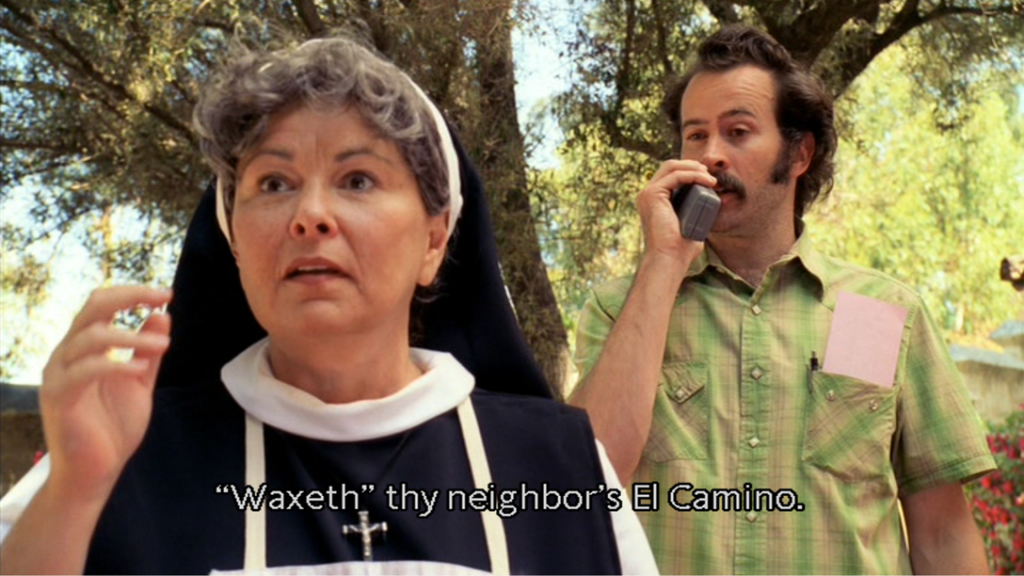 [5]
[5]To make up for deceiving her, Earl proves to his former neighbor Millie that the voice of God was him all along.
Much of the humor is genuinely hilarious, having to do with the mischievous and/or criminal nature of Earl and his associates in the past. At one point, Earl realizes that he can manipulate an obnoxious old woman named Millie who serves as a local authority and has been harassing him and his friends about supposed policy violations. He discovers that her hearing aid picks up the frequency of his walkie-talkie, and she interprets this as the voice of God. Believing that God speaks in the English of the King James Bible, he gives her various commands, including “putteth thy left foot in and shaketh it all about.”
Interestingly, the show deals with Hispanics in a way that would be considered “racist” if it were depicted under the current social justice regime. Latin America is repeatedly lampooned for its superstitions, as well as its high crime rates and general brutality. For American Hispanics, as with the whites in the series, the show makes light of their poverty and tendency to live in cramped conditions; at one point, we learn that Catalina is sleeping on the floor of a small laundry room with several other women while the machines are running. Although it generally avoids mocking blacks, the series does manage to make fun of Africa, with Earl betting on a Congolese election in which one candidate boasts that, unlike his opponent, he is not a cannibal.
There is also an interesting commentary on white people’s perpetually thwarted desire to morally uplift other parts of the world when Earl tries to convert a Hispanic gang leader to his way of thinking. After Catalina is deported to a village in Latin America, Earl sets out to rescue her, but is quickly kidnapped by gangsters. The gang leader, Diego, is Catalina’s uncle, and promises to bring Earl to see her, but first takes him along on some “errands.” This first involves the gangsters entering a house while Earl hides in the car, hearing gunshots and screaming. Afterwards, Diego realizes he has visited the wrong house, and shows his current level of morality by proposing to “send them a ham” to make up for his mistake.
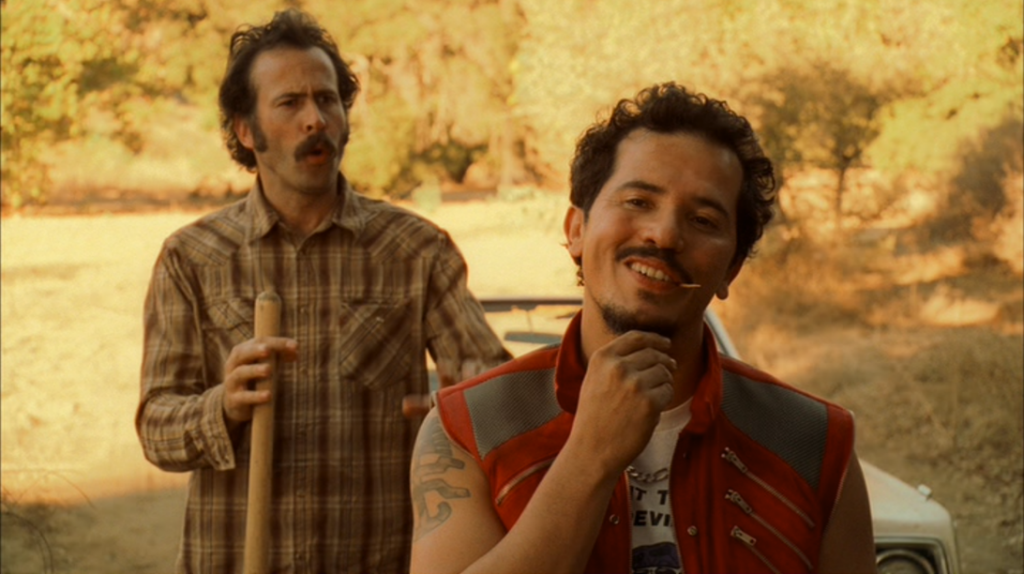 [6]
[6]Hispanic gangster Diego offers to spare a man’s life and kill his wife instead, but Earl corrects him.
Diego is about to execute a man for “being behind on his goat payments” when Earl interrupts him, saying that he can have nothing to do with the murder due to his dedication to karma. The gangster is intrigued by Earl’s ideas, but does not exactly understand them. Morality is clearly confusing to the Latino, so he first proposes to kill the man’s wife in his place, then his children, before Earl suggests a payment plan.
Diego is briefly more friendly, but ultimately, the gang leader gives up what little morality he had absorbed from Earl due to the pressures of his social environment. Other gangsters get the impression that he has gone soft, meaning that “they can do whatever they want,” attacking his followers and cutting out one man’s tongue. He gladly rededicates himself to brutality, vowing revenge with his own formulation of karma: “Do bad things, and Diego happens.”
Unfortunately, the series is marred by a significant amount of material on the level of Ow, My Balls!, the fictional television show from the Mike Judge movie Idiocracy. Incompetence and ignorance are common themes, and laughing at such things is a natural instinct which is not necessarily malicious. However, some of the content would only be amusing from a sadistic point of view. There are numerous jokes which consist only in the fact that a character is experiencing something unpleasant, and some of this comes across as mean-spirited on the part of the writers, as if they simply mean to humiliate lower-class white men.
Indeed, the entire premise of the show is arguably anti-white. The series focuses on the criminality and dysfunction of poor whites, who a police officer at one point derisively calls “these trailer park people.” Although to some degree people of other races are mocked as well, the focus is overwhelmingly on poor whites. Joy’s lawyer at one point addresses her as “you ignorant white trash whore,” but of course no such racial slurs are used for any other group.
My Name Is Earl is recommended, both as a study in social justice propaganda and as a window into a period of time when lampooning non-whites was more acceptable and the mainstream had not yet become dominated by the current anti-humor ideology. Despite being criticized by some as “bigoted,” it was well-received overall, and understandably so. It is at times genuinely funny and creative, but unfortunately, some of the most creative people have often bought into some of the worst ideas.
